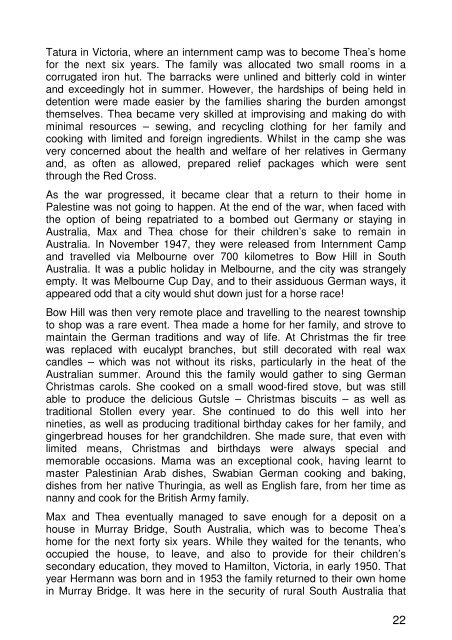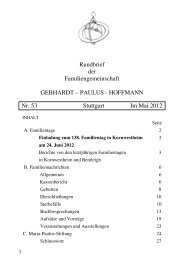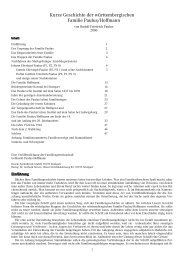Rundbrief der Familiengemeinschaft GEBHARDT – PAULUS ...
Rundbrief der Familiengemeinschaft GEBHARDT – PAULUS ...
Rundbrief der Familiengemeinschaft GEBHARDT – PAULUS ...
Erfolgreiche ePaper selbst erstellen
Machen Sie aus Ihren PDF Publikationen ein blätterbares Flipbook mit unserer einzigartigen Google optimierten e-Paper Software.
Tatura in Victoria, where an internment camp was to become Thea’s home<br />
for the next six years. The family was allocated two small rooms in a<br />
corrugated iron hut. The barracks were unlined and bitterly cold in winter<br />
and exceedingly hot in summer. However, the hardships of being held in<br />
detention were made easier by the families sharing the burden amongst<br />
themselves. Thea became very skilled at improvising and making do with<br />
minimal resources <strong>–</strong> sewing, and recycling clothing for her family and<br />
cooking with limited and foreign ingredients. Whilst in the camp she was<br />
very concerned about the health and welfare of her relatives in Germany<br />
and, as often as allowed, prepared relief packages which were sent<br />
through the Red Cross.<br />
As the war progressed, it became clear that a return to their home in<br />
Palestine was not going to happen. At the end of the war, when faced with<br />
the option of being repatriated to a bombed out Germany or staying in<br />
Australia, Max and Thea chose for their children’s sake to remain in<br />
Australia. In November 1947, they were released from Internment Camp<br />
and travelled via Melbourne over 700 kilometres to Bow Hill in South<br />
Australia. It was a public holiday in Melbourne, and the city was strangely<br />
empty. It was Melbourne Cup Day, and to their assiduous German ways, it<br />
appeared odd that a city would shut down just for a horse race!<br />
Bow Hill was then very remote place and travelling to the nearest township<br />
to shop was a rare event. Thea made a home for her family, and strove to<br />
maintain the German traditions and way of life. At Christmas the fir tree<br />
was replaced with eucalypt branches, but still decorated with real wax<br />
candles <strong>–</strong> which was not without its risks, particularly in the heat of the<br />
Australian summer. Around this the family would gather to sing German<br />
Christmas carols. She cooked on a small wood-fired stove, but was still<br />
able to produce the delicious Gutsle <strong>–</strong> Christmas biscuits <strong>–</strong> as well as<br />
traditional Stollen every year. She continued to do this well into her<br />
nineties, as well as producing traditional birthday cakes for her family, and<br />
gingerbread houses for her grandchildren. She made sure, that even with<br />
limited means, Christmas and birthdays were always special and<br />
memorable occasions. Mama was an exceptional cook, having learnt to<br />
master Palestinian Arab dishes, Swabian German cooking and baking,<br />
dishes from her native Thuringia, as well as English fare, from her time as<br />
nanny and cook for the British Army family.<br />
Max and Thea eventually managed to save enough for a deposit on a<br />
house in Murray Bridge, South Australia, which was to become Thea’s<br />
home for the next forty six years. While they waited for the tenants, who<br />
occupied the house, to leave, and also to provide for their children’s<br />
secondary education, they moved to Hamilton, Victoria, in early 1950. That<br />
year Hermann was born and in 1953 the family returned to their own home<br />
in Murray Bridge. It was here in the security of rural South Australia that<br />
22







